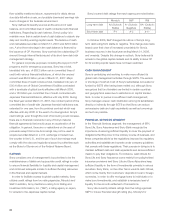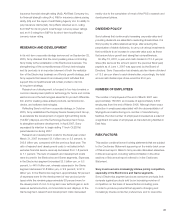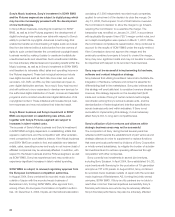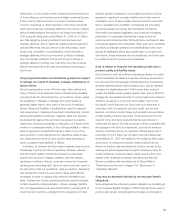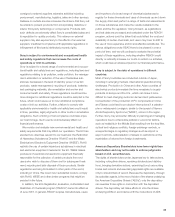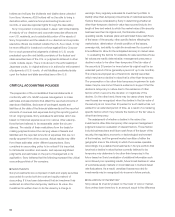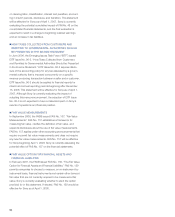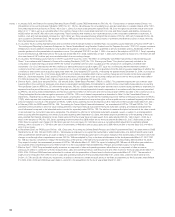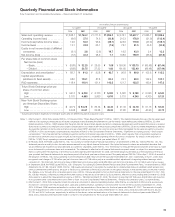Sony 2007 Annual Report Download - page 92
Download and view the complete annual report
Please find page 92 of the 2007 Sony annual report below. You can navigate through the pages in the report by either clicking on the pages listed below, or by using the keyword search tool below to find specific information within the annual report. 89
consigns to external suppliers extensive activities including
procurement, manufacturing, logistics, sales and other services.
Reliance on outside sources increases the chance that Sony will
be unable to prevent products from incorporating defective or
inferior third-party technology or components. Products with
such defects can adversely affect Sony’s consolidated sales and
its reputation for quality products. This reliance on external
suppliers may also expose Sony to the effects of an external
suppliers’ insufficient compliance with applicable regulations or
infringement of third-party intellectual property rights.
Sony is subject to environmental and occupational health
and safety regulations that can increase the costs of
operations or limit its activities.
Sony is subject to a broad range of environmental and occupa-
tional health and safety laws and regulations, including laws and
regulations relating to air pollution, water pollution, the manage-
ment, elimination or reduction of the use of hazardous sub-
stances, decreases in the level of standby power of certain
products, waste management, recycling of products, batteries
and packaging materials, site remediation and worker and
consumer health and safety. These regulations could become
more stringent or additional regulations could be adopted in the
future, which could cause us to incur additional compliance
costs or limit our activities. Further, a failure to comply with
applicable environmental or health and safety laws could result
in fines, penalties, legal judgments or other costs or remediation
obligations. Such a finding of noncompliance could also injure
our brand image. Such events could adversely affect our
financial performance.
We monitor and evaluate new environmental and health and
safety requirements that may affect our operations. The EU has
enacted two directives relevant to our business: the Restriction
of Hazardous Substances Directive (“RoHS”) and the Waste
Electrical and Electronic Equipment Directive (“WEEE”). RoHS
restricts the use of certain hazardous substances in electrical
and electronic equipment marketed in the EU. WEEE makes
producers of electrical and electronic equipment financially
responsible for the collection of certain products from end
users who wish to dispose of them and for subsequent treat-
ment, recycling and safe disposal of those products. Similar
regulations are being formulated in other parts of the world,
including in China. We could incur substantial costs to comply
with RoHS, WEEE and other similar programs that might be
enacted in the future.
In addition, the EU’s Registration, Evaluation, Authorisation and
Restriction of Chemicals program (“REACH”) came into effect as
of June 2007. In general, REACH requires manufacturers, users
and importers of a broad range of chemical substances to
register for these chemicals and uses of chemicals up and down
the supply chain and perform a range of tests and assessments
on those substances and make the results available to the
public and the EU regulators. Going forward, as registrations
and test data are processed and evaluated under the REACH
program, actions could be taken that could affect the cost and
availability of certain chemicals, and users may have to shift to
the use of more expensive and/or less effective substitutes. The
various obligations under REACH are to be phased in over a
period of time, and we will continue to evaluate the potential
impact of these regulations, including whether REACH could
directly or indirectly increase our costs or restrict our activities,
which could have an adverse impact on our financial performance.
Sony is subject to the risks of operations in different
countries.
Most of Sony’s activities are conducted outside of Japan,
including in emerging markets. International operations bring
challenges. Production in China and other Asian countries of
electronics products increases the time necessary to supply
products to Europe and the U.S., which can make it more
difficult to meet changing customer demand and preferences.
Concentration of the production of PC components in China
and Taiwan could lead to production interruptions if a catastro-
phe or widespread contagion, similar to the spread of Severe
Acute Respiratory Syndrome (“SARS”), occurs in the region.
Further, Sony may encounter difficulty in planning and managing
operations due to unfavorable political or economic factors,
such as instability in the Middle East resulting from the Iraq War,
cultural and religious conflicts, foreign exchange controls, or
unexpected legal or regulatory changes such as import or
export controls, nationalization of assets or restrictions on the
repatriation of returns from foreign investments.
American Depositary Shareholders have fewer rights than
shareholders and may not be able to enforce judgments
based on U.S. securities laws.
The rights of shareholders under Japanese law to take actions,
including voting their shares, receiving dividends and distribu-
tions, bringing derivative actions, examining Sony’s accounting
books and records and exercising appraisal rights are available
only to shareholders of record. Because the depositary, through
its custodian agents, is the record holder of the shares underlying
the American Depositary Shares (“ADSs”), only the depositary
can exercise those rights in connection with the deposited
shares. The depositary will make efforts to vote the shares
underlying ADSs in accordance with the instructions of ADS



